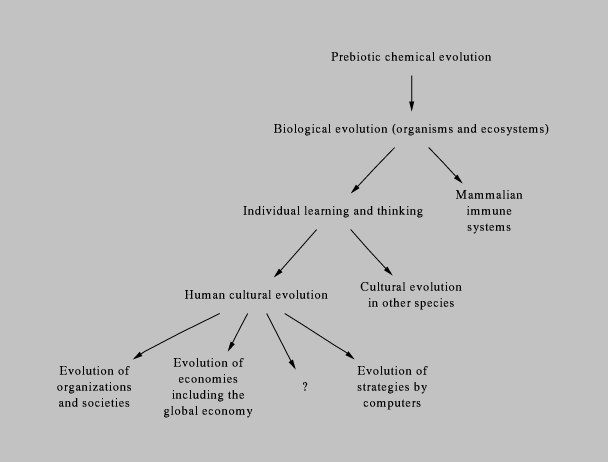 ps
psMurray Gell-Mann's The Quark and the Jaguar subtitled `Adventures in the Simple and the complex', ISBN 0-7167-2725-0, Freeman.
overview of complexity, complex adaptive systems, particle physics, quantum decoherence (i found this section incomprehensible), and biodiversity. liberal doses of dry anecdotes and advertisements for the SFI.
pay careful attention to Gell-Mann's intention:
ie a high level of abstraction, cf religion.
on p20 he gives a standard evolutionary hierarchy:
 ps
psFigure: Some complex addaptive systems on Earth.
his definition of complexity: makes the distinction between the english word, which has a numer of related meanings and senses, only one of which is the mathematical notion of algorithmic complexity (kolmogorov).
but identifies the necessary assumptions (ie sources of subjectivity) as way of course graining (aka abstracting) and choice of language, thus concluding `any definition of complexity is necessarily context-dependent, even subjective.' (p33).
all-the-same (all zeros) and all-different (all noise) have opposite AIC. but my (the hopefuly normal-human) notion of complexity confounds these cases to `simple' and reserves `complex' for the living middle ground (visual analogy: the hairy boundary between the inside and outside of the M-set).
Gell-Mann explores this in sections on `Separating Regularity from Randomness' and `Randomness vs Complexity', but he moves the problem to the word `regular' and schema size --- essentially compression ratio, but never makes the punch: this abstraction function with its ratio is the result of evolutionary pressure on mind. on p59 he sez:
p64 gives his definition of life: doesn't abstract it to mean all of complexity. he sticks to a genome, ie passing of information, but he really means `meaning'.
i wonder if the randomness of QM is a source of part of what makes a good abstraction function: the position of every molecule in a gas is not meaningful because it is chaotically sensitive to quantom randomness. that's a start, but there's much more.
p94 Zipf's Law, Power Laws, distribution of city populations, distribution of avalanche size in sandpile.
p101
p239 doesn't make a connection between punctuated equilibrium and the power-law of the sandhill.
p244 is there a drive towards high complexity? Gell-Mann is skeptical and cites the increasing distribution of the max of a joint distributions. but he admits there seems to be something going on, but doesn't comment further.